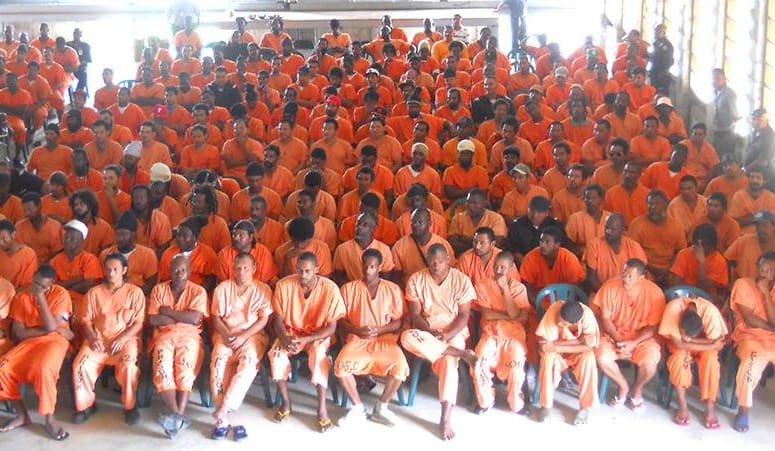Transcribed from the 20 May 2017 episode of This is Hell! Radio (Chicago) and printed with permission. Edited for space and readability. Listen to the whole interview:
Once we got out of the heyday of American manufacturing in the sixties, and then things got hard in the seventies, many companies and executives and shareholders shook off any notion of community responsibility or stakeholder capitalism, and just said, “We’re in this for ourselves.” HBS went right down that path with them, and hasn’t come back.
Chuck Mertz: One school is graduating an MBA elite that has direct access to the levers of power from Wall Street to the Beltway. And that one school has lost its way, which explains a lot of the problems the US economy faces today. Here to help us understand how Harvard Business School is destroying our economy one sector at a time, journalist Duff McDonald is author of The Golden Passport: Harvard Business School, the Limits of Capitalism, and the Moral Failure of the MBA Elite.
Welcome to This is Hell!, Duff.
Duff McDonald: Thank for having me.
CM: In the wake of the financial crisis of 2008, the Harvard Business School was still taking a pounding for the role their alumni played in the Great Recession. Then, along came what you call a “product that allowed Harvard Business School to claim with a straight face that it is developing leaders who will make a difference in the world.”
Casey Gerald gave a speech during Harvard Business School’s 2014 class day that you a cite a commentator calling “the most stirring speech ever by an MBA.” You mention how the speech has been viewed online 200,000 times, then you add, “Here was Gerald, who had entered HBS with an eye on his own wants but emerged with an eye on others’ needs.”
So the story he told was one of transformation, going from being selfish to being selfless, to becoming a true leader at Harvard Business School. Yet a few years later you meet up with Casey Gerald, and he tells you this about the Harvard Business School: “What I think the school does, and does very well, is train people in situations of ambiguity to take imperfect information, uncertain outcomes, and tight deadlines, and figure out what to do in the most effective, efficient, and powerful way.
“But the tragedy of the Business School is that you can use that ability to do two things at once: to build great companies and destroy the planet in the process, or its people. Robert S. McNamara was an HBS alum. He helped turn around Ford Motor Company, and then went on to wreak destruction in Vietnam. We have to have a conversation about which thing we’re doing and why we should be doing one and not the other. There’s nothing ambiguous about it.”
Is the tragedy, then, of the Harvard Business School that they have anything to do with anything but business? And that we view them as somehow—despite training only in business—experts at everything from climate change to war?
DM: That’s a great point. The core of the teaching at HBS and elsewhere is an analytical worldview where you measure everything you can, stack it all up, look at your spreadsheets, make some decisions and try and tweak the numbers. And they have obviously had enormous success at putting people at the top of the corporate world: the last time the Financial Times put out the FT 500 of the largest companies in the world, of those companies with MBA CEOs, Harvard had more than double the closest competitor, which was Stanford.
But you’re right. What has happened is we have confused an ability to make decisions in a corporate milieu, where cost-cutting might be the answer, with something approaching wisdom. We have looked to MBAs for leadership across a wide spectrum of organizations, and I think it is a huge mistake. They have started to push their analytical worldview down into every facet of our lives, particularly where it shouldn’t be and it isn’t welcome.
CM: How much do you believe Harvard Business School has an impact on its graduates? Because in a recent Vanity Fair article, you write how Harvard Business School created Steve Bannon. Did Harvard Business School make Steve Bannon into the evil person that everybody in the liberal establishment sees?
DM: I don’t think HBS gave him his worldview. That seems to be about as idiosyncratic as they come. What I think it gave him was arrogance, a sense of destiny and the knowledge that he is right. One of the things that HBS does, which I think is a colossal error, is tell people that simply by virtue of having been admitted to the school, they are America’s future leaders. And if leadership is something that many of us aspire to (we would like to be a good example to those around us; we would like to help people and meet our communal needs), you have to work to become a leader. You have to earn the respect of others. You have to demonstrate through your actions and abilities that you are worth following.
To tell a group of 26-year-olds that they are already leaders has to have a disastrous effect on what motivates them. If you no longer need to demonstrate leadership, then you can just jump to the fun stuff. Where’s my money? Where’s my promotion? That in and of itself is probably one of the things that happened to Bannon.
That said, I was talking to Jamie Dimon for this book, and he said, “Listen. HBS is not going to change you fundamentally. It’s not going to change what you want out of life. If you’re greedy, or if you’re not, or if you want to run a company or not, what it’s going to do is give you tools to help you get there.” But many of the tools are not the right ones to be using. They graduate a group of people who think they have a destiny that they haven’t yet earned, and that goes on to wreak havoc in their own careers, in the companies they work for, and in the organizations they run.
CM: So is the worst thing about the Harvard Business School curriculum, then, Arrogance 101?
DM: That’s one of the worst things. The other is an excessive focus on what they call control. Business schools came into being a century ago because American business had grown so quickly that suddenly there were organizations that were bigger and more complex than there had ever been in the world, and we needed a new player in there—a manager—to help coordinate the flow of information and materials. The way you do that in a large, say, manufacturing organization, is really just cost controls. If you’re in a scale business making widgets, you want to make them as cheaply as possible and distribute them as cheaply as possible. But when you push financial control and financial analysis too far into the decisionmaking process of an organization, you inevitably end up with a decreasing emphasis on other things that matter, like quality, satisfaction, community.
When it looked like the pie was just going to grow forever, it was very easy for managers to be benevolent, and have an eye on constituencies other than their shareholders. Once that pie started shrinking, though, managers and shareholders basically got in a bare-knuckle brawl over who got to keep the shrinking pie.
The finance people used to just be the finance people in a company. They needed to make sure there was enough money in the bank to pay people’s salaries and buy their materials. The finance people, after mid-century, ascended to running companies entirely, as CFOs became CEOs. And their tools are the tools of control. They are not the tools of innovation and the tools of true leadership. They are the tools of getting your hands around something and controlling it to the point where you often stifle it.
CM: Founded in 1908, the goal of Harvard Business School was to create what you call “an enlightened managerial elite.” How has that end goal changed since 1908? Is the Harvard Business School about making more than an enlightened managerial elite today?
DM: That was the premise that they were founded on, and my research showed me that it was for fairly specific reasons. When the folks at Harvard who were in support of the idea went to their colleagues and said, “We should start a business school,” the initial reaction was one of horror. One of the professors said something like, “What, sully the robes of Chaucer with gold?” So at the time, Harvard’s attitude was, “We don’t do trade schools; we don’t do vocational stuff. A business school is not our thing.”
But the people who wanted to do it anyway said, “No no, we’re not trying to train accountants or controllers. We want to train managers who understand their responsibilities to the community and society.” At that point, the rest of Harvard could say, “Ah, that sounds more like us.”
The other thing that happened was that business at the turn of the last century was booming, and the children of the elites in society were looking to get into business careers. It was suddenly an attractive thing (whereas historically it was always the professions: doctors, lawyers, priests). And Harvard didn’t have a school for that, so these elite children who were itching to go get educated would end up at some other place that would deprive them of the credential of choice, which is Harvard, so they needed to expand the credential.
They probably did a good job of it for several decades. But once we got out of the heyday of American manufacturing in the sixties, and then things got hard in the seventies, many companies and executives and shareholders shook off any notion of community responsibility or stakeholder capitalism, and just said, “We’re in this for ourselves.” HBS went right down that path with them, and hasn’t come back.
CM: You’ve said that Harvard Business School needed to choose to be either truly independent (in which case their research would truly be unbiased) or they could get in bed with big business and try to work with it to provide it with the raw executive talent it needed. They went with the second choice, but to this day they claim they went with the first one as well, which you say is impossible and therefore disingenuous on Harvard Business School’s part.
How well is Harvard Business School understood? How accurately is it represented in the media with our leadership and among the public, as an institution whose graduates are trained to do what is best for corporations first, big business first, and everything else is second, even potentially country?
DM: What they’ve done in selling out to business is deprive everyone there from the opportunity to look at this thing called capitalism from an unbiased perspective. Professors consult for companies. The school seeks money from companies to fund their research about those companies. They seek fundraising to build buildings and name them after people, and also issue case studies on those same people who gave them $50 million. It’s impossible to be dispassionate at that point.
And the Economist actually ran an article this week about the book, saying essentially that one thing Harvard could do is just spin off Harvard Business School as a business, and just call it what it is. It’s a great point. Because somewhere along the way, it lost its qualification as an actual educational institution, and just became a facilitator and cheerleader for big business and capitalism, without even deigning to question the nature of capitalism anymore.
CM: How much is challenging the Harvard Business School a challenge to today’s US economic system?
DM: I make the point in the afterword of the book that I am not anti-capitalist. I don’t know enough about all the major economic systems of history to claim that I have divined the perfect structure for an economy. It’s clear that Western capitalism has raised standards of living to a massive degree. The question that I think is the most crucial, that the school should have been asking from the very beginning, is: How do we improve this?
Capitalism is a human creation. All human creations are flawed and can improve, especially if they require collaboration. HBS, being part of a great university and supposedly dedicated to the pursuit of truth, was uniquely positioned to stand outside it and say, “This is wrong, that is wrong, we could do this better, we could do that better.” There are tons of professors that do that every day there. But the net effect, the implicit assumptions in the education of an HBS MBA are ones that they shouldn’t be making. You should not assume that this system is perfect, so let’s just optimize for ourselves. You should be standing outside of it and saying, “How do we make this so everything is better for everyone?”
There is a segment of our society that has built-in advantages, with its socioeconomic positioning, and we are increasingly training them to be lemmings. The school claims it’s a school of leadership, and yet every single year, just look at where the most money was made last year—that’s where you see next year’s MBAs going. They are a producer of followers.
CM: Does HBS ignore capitalism’s flaws? If so, how does it affect us when they’re not focusing on the shortcomings of capitalism?
DM: Here’s a good example. They were founded with the perspective of the boss, the managerial perspective. They trained their students through the Case Method, with situations where you’re in this company and this is going on, competitor X, product Y, what do you do? And it’s always the perspective from the top. They have rarely, if ever, had an acknowledgment in their teachings that labor is as crucial a component of any organization as leadership. They had a program that brought labor leaders in for a couple of decades after the middle of the last century, and then they canceled it—guess when?—in the Reagan era, when he busted the air traffic controllers’ strike and unions were dealt their death blow. At that point, HBS decided it was no longer a relevant thing for them and they ditched the program.
Do they talk enough about climate change and sustainability? No, they don’t. Do they talk too much about finance and the rewards of management? A professor did a huge study on CEO compensation, and the point he made in it was that most people don’t even know how overpaid CEOs are. They asked people they thought the ratio of CEO-to-worker pay is, and most people vastly underestimated it. This professor thought this was a really interesting and relevant finding. The appropriate reaction would be: how on Earth have we gotten to a situation where we think that one person who gets up and spends the same amount of time in an office as the guy on the assembly line should be paid five hundred times what that other person is worth? Instead, they’ve helped make arguments to support that scenario, and then issued research that says, “And guess what? People don’t even know how much you’re paid!”
CM: You’ve said of the Case Method, “Can it create thinkers? It can certainly help people engage in new kinds of thinking. Can it create leaders? Unless you put the ability to bullshit at the top of your list of attributes when you’re looking for a leader, then there are other routes you might want to consider first.”
How fair is it, then, to label Harvard Business School graduates as those who went to school for bullshitting?
DM: I think that’s definitely a component of their education, which a lot of people would tell you is a good one: the ability to stand up in front of a crowd of people and speak extemporaneously about a subject that you may not know a whole lot about. Most of us would love to have that ability at some point in their lives—when suddenly the spotlight’s on you, and everybody’s like, “What do you think?” They are trained to react effectively in that situation.
On the one hand, bullshitting is obviously not something we want to train people to do, but on the other hand, confidence and articulateness in conversation is great. I think the main problem with the Case Method is that in order to make sure that students aren’t completely terrified to speak, they’ve insisted almost since the beginning that there is no correct answer, just better or worse expressions or articulations of a point. You could see that this is correct, largely, in business. Should we start product X or product Y? Both could be right; you just need to make a decision. And HBS teaches people to make decisions. But by insisting that there is no correct answer, I think they’ve created an underbelly to the Case Method, a moral ambiguity that stays with their graduates, where they can convince themselves that things that are definitely not as right as another decision—layoffs versus a reduction in executive pay—could be the right answer as long as you express it thoughtfully.
That’s not the case. Sometimes there is an obvious right answer. To insist that there never is has to do something to the moral compass of the people who go there.
CM: So how much, then, does the Harvard Business School take morality and ethics out of economic concerns and business decisions?
I was born in Detroit, and I’m very familiar with what took place in Flint. There was this idea in Flint that you had a patron: essentially, the people who were running the factories. They were giving back to the community. They were constantly giving back to the community. Now, we don’t see that anymore. We don’t see the kind of loyalty that corporations used to have for the community that they are from.
How much of that is from the Harvard Business School eliminating morality and ethics from business decisions?
DM: There’s a great book called The Fracturing of the American Corporate Elite by Mark Mizruchi. He basically pinpoints where the sense of community stewardship went out the window. It was postwar, when America was dealt the first blow to its self-image as the greatest country in all of history and forevermore, and managers were shown not to be omnipotent. There was the German invasion, the Japanese invasion, there was Vietnam, there was the oil crisis. Something happened then. When it looked like the pie was just going to grow forever, it was very easy for managers to be benevolent, and have an eye on constituencies other than their shareholders. Once that pie started shrinking, though, managers and shareholders basically got in a bare-knuckle brawl over who got to keep the shrinking pie.
The average HBS graduate is probably doomed to be unreflective about the qualities and the strengths and weaknesses of capitalism, and are more focused on optimizing their own performance within it. They may have been that way before they got there. But the tragedy of the school is that they could have been a force for awakening that impulse, and instead have ultimately deadened or eliminated it in the majority of people that they graduate.
When shareholder capitalism took over the country in the eighties, one thing HBS did was hire a professor named Michael Jensen, whose theories about the character of managers were a complete 180 compared to what HBS had taught. He basically said managers are whores, and we need to motivate them with stock options; that’s the only way to get them to do what you want (“you” being the shareholder). He and his colleagues helped provide the intellectual foundation for this shift in the way American business saw itself, and fortified it through research papers that proved that this was the only way to do things. We have been on that path ever since.
So I don’t think they turned us into that. The pie shrank for everyone, and suddenly there was a fight—and they picked the wrong side.
CM: You point out that Harvard Business School is “studying the wrong things things (in the focus on measurement) in the wrong way (focusing on how to think, not what to think), and creating the wrong kinds of people (people who are good at bullshitting) who are now ‘trained’ in something that is untrainable (leadership), while coming to terms with their lack of compassion through this authentic leadership.”
Does all of this make sense to make somebody who is an attractive potential employee at a financial firm or some other business that Harvard Business School is supposed to be providing executives for? Is this the kind of person who financial firms want?
DM: Sure. I was an undergraduate at Wharton. I don’t have an MBA, but I went to business school undergrad. The ability to quickly use analytical skills and re-jigger variables and weightings here and there is the majority of the job of a financial analyst. HBS does graduate people who can be very effective at that, and who have the ambition to work all night for an extra dollar, and who have managed to adopt what I talk about as the view of a company in abstraction: if you’ve never worked on the factory floor, but you get brought in as the CFO and you’re pulling your levers and buying fewer machines, laying off more workers, it’s almost as if you’re existing at a remove from life itself.
In finance, that’s okay, because that’s what finance is. I don’t mean it’s okay that this happens, but this is why they want them. All finance does is deal in abstractions. What is a stock price? It’s supposedly an indication of the health of a company. But it’s one remove away. If all you want is people who are capable of dealing in abstractions and analytics, go hire yourself an MBA. If you want people who have vision, who have compassion, I’m sure you can find a lot of MBAs who have those qualities. But I wouldn’t use them as your primary pool for recruiting.
CM: You blame the pervasiveness of short-term thinking, economic inequality at a hundred-year high, little progress on climate change, all as proof that corporate society is broken. And that society is broken because of the Harvard Business School. Are our biggest challenges today the fault of not the Republicans or the Democrats, but the Harvard Business School?
DM: There is a segment of our society that has built-in advantages, with its socioeconomic positioning, and we are increasingly training them to be lemmings. The school claims it’s a school of leadership, and yet every single year, just look at where the most money was made last year—that’s where you see next year’s MBAs going. They are a producer of followers.
If all we’re doing is sending some of the brightest young people that we have into careers where they’re just chasing the almighty dollar trying to make maximum money in the shortest period of time, then we’re going to end up with what we have, which is an economy that lurches from excess to excess because they’re like heat-seeking money missiles that go into wherever the new thing is, and invariably bring a level of excess to it, and then something blows up.
Enron is a great example of it. That whole place was Harvard MBAs, and it was a good idea to have a “natural gas bank,” which is what they started with, and then they drank their own Kool-Aid and decided that MBAs have the greatest ideas of all, and that company became what you get if what you do is hire all Harvard MBAs. In the end, it was essentially a complete fraud that collapsed under the weight of overly optimistic expectations and under-delivery of results.
CM: We’ve been seeing bubbles and busts over the last few decades; that seems to be a pattern that we could link to Harvard business school graduates. To you, what explains why Harvard Business School gave up on caring about and thinking about and asking about the long term? It’s almost as if they simply no longer care about the economic success of the system they studied and benefited from. Why did they decide that the long-term sustainability of the economic system—which, again, they benefit from—was no longer that important?
DM: There are a couple ways you can answer that. One is a point I make in the introduction, which is that it’s always difficult for the winners in any system to force themselves into a serious discussion of what is wrong with the system. It’s working for them.
The other thing I would say is that we have one of the most antagonistic relationships between business and government of any capitalist country, if not the most antagonistic. What that’s done is short circuit the ability for fruitful dialogue between government (which is supposed to look out for the interests of us all) and business (which is by nature more selfish). One of the things HBS has utterly failed at is fostering a better notion of cooperation between government and business. If you were to listen to all the business people in this country, every single person who works in government is lazy, wasteful, and just getting in the way of our success. That’s so cynical. It just boggles the mind that a school that’s supposed to be about creating leaders who make a difference in the world can buy into that notion. That’s one of the main things that’s holding us back.
One of their professors made a point: he said, “Look at China. There is a benefit from total government control. When they decide that something needs to happen, it happens. We don’t want that in this country, but we should at least aspire to take everybody on a basis that they have good intentions, and then go from there.” Business-government relationships here don’t even start with that. It starts with an animosity that HBS could have helped ameliorate, but they haven’t.
CM: Without analyzing, without critiquing, without investigating capitalism’s shortcomings, how little do Harvard Business School MBA graduates understand capitalism?
DM: It obviously varies. I hate to say it, but Steve Bannon seems to have thought a lot about capitalism. You may not agree with him, but the man’s clearly thought a lot. The average HBS graduate is probably doomed to be unreflective about the qualities and the strengths and weaknesses of capitalism, and are more focused on optimizing their own performance within it. They may have been that way before they got there. But the tragedy of the school is that they could have been a force for awakening that impulse, and instead have ultimately deadened or eliminated it in the majority of people that they graduate.
CM: Duff, it’s been a pleasure having you on this week’s show. Thanks so much.
DM: Thanks for having me.





